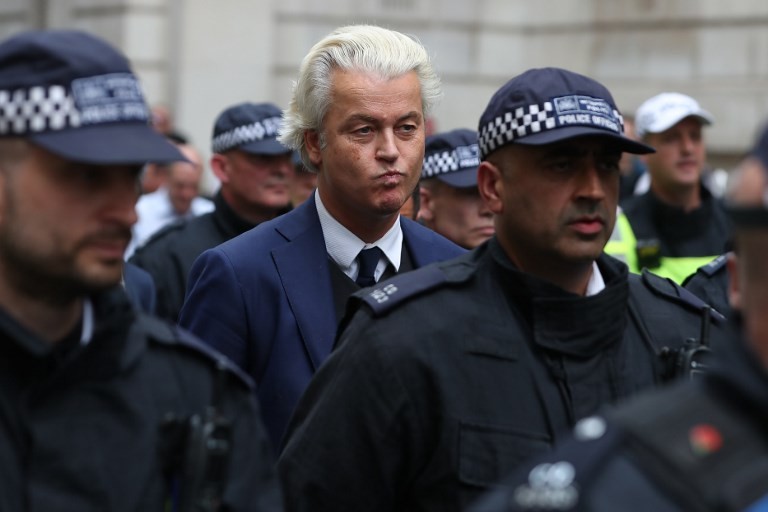Popular Reads
Top Results
Can't find what you're looking for?
View all search resultsPopular Reads
Top Results
Can't find what you're looking for?
View all search resultsWilders among us
As we prepare for next year’s presidential and legislative elections, there are real concerns that the nation is turning its back on its democratic and pluralistic achievements over the past two and a half decades.
Change text size
Gift Premium Articles
to Anyone
 Dutch far-right politician Geert Wilders (center) is escorted away by police after speaking at a gathering of supporters of British far-right spokesman Tommy Robinson in central London on June 9, 2018, following the jailing of Robinson for contempt of court.
Daniel LEAL-OLIVAS / AFP (AFP/Daniel Leal-Olivas)
Dutch far-right politician Geert Wilders (center) is escorted away by police after speaking at a gathering of supporters of British far-right spokesman Tommy Robinson in central London on June 9, 2018, following the jailing of Robinson for contempt of court.
Daniel LEAL-OLIVAS / AFP (AFP/Daniel Leal-Olivas)
T
he shocking victory of far-right Party for Freedom (PVV) politician Geert Wilders in the Dutch general election on Nov. 22 has alarmed the world, and his anti-Islam rhetoric in particular could undermine ties between the Netherlands and Indonesia, the world’s largest Muslim-majority country, if he comes to power.
But the Netherlands is not alone in experiencing this worrying phenomenon. These days, large constituencies in a wide variety of countries have taken up with extreme-right leaders, notably in the United States, Italy and Hungary.
Many in Indonesians have been annoyed and upset by Wilders’ repeated mocking of Islam and the Quran, for which he has faced death threats. But as the proverb goes, "Why do you look at the speck of sawdust in your brother's eye and pay no attention to the plank in your own?" Indonesia is by no means immune to far-right movements. Intolerance, anti-minority mentalities and authoritarian tendencies loom large here.
As we prepare for next year’s presidential and legislative elections, there are real concerns that the nation is turning its back on its democratic and pluralistic achievements over the past two and a half decades, a reversal that threatens to create the conditions for a resurgence of New Order-style authoritarianism. We can criticize the Dutch people's political choices from afar, but we have many of the same issues at home, and these, at least, we can do something about.
"The winds of change are here! Congratulations to Geert Wilders on winning the Dutch elections," Hungarian PM Viktor Orban wrote on the platform formerly known as Twitter in response to his ideological peer’s victory. We hope we will not receive a similar congratulatory message from the Hungarian leader when we have chosen our new president next year.
The notorious French far-right politician Marine Le Pen described Wilders’ victory as the result of "people who refuse to see the national torch extinguished [and believe] that the hope for change remains alive in Europe".
Wilders has expressed his intention of becoming the next prime minister of the European Union's fifth largest economy. As in many countries where politicians must form post-electoral coalitions to rule, the victorious Wilders may tone down his rhetoric and policies for the sake of power.
He has yet to secure majority support to become the new prime minister, even with his PVV winning 37 percent of the 150-seat parliament. The negotiations to achieve that majority may be lengthy.
But his track record as a politician since 1998 and as chairman of the PVV since 2006 signals that he will act as an authoritarian-style leader who will seek to oppress minority groups, Islam and migrants, which he hates. He has also expressed his intention to hold a “Nexit” referendum to determine whether the Netherlands should leave the European Union.
All the far-right leaders in the West are great fans of former US president Donald Trump, who is the Republican Party candidate and current front-runner for the country’s November 2024 election. His die-hard supporters do not care that he is facing multiple criminal charges related to abuses of power.
In his speeches, Trump has drawn attention to domestic issues such as illegal immigration, offshoring of American jobs, the US national debt and terrorism, which he links to Islam.
He champions anti-Islam and anti-migrant narratives and has repeatedly said the US has been too generous to what he sees as an ungrateful world. He has also boasted that he could weaken China if regains power in 2024.
Far-right leaders tend to love to exaggerate the power of their countries and are reluctant to cooperate, let alone share their wealth, with other nations because they believe the country will be much better off if it focuses on itself.
Throughout the world, citizens have been democratically electing would-be dictators who push prejudiced and authoritarian policies. In the Netherlands, many voters know that Wilders could threaten world peace and democracy, but a number of them voted for him nonetheless.
We have to be aware of this global tendency. As the world’s third-largest democracy, Indonesia is by no means free of such dangers. There are always Wilders among us.










